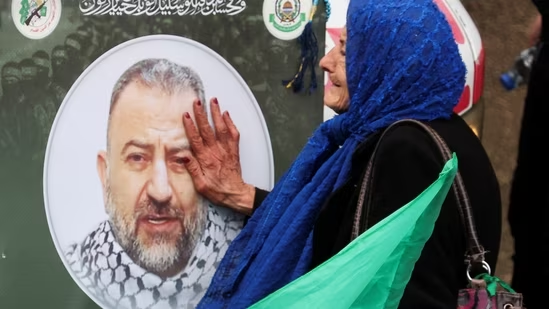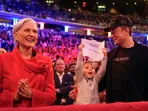Death of a Messenger: What Saleh al-Arouri’s death means for Hamas
On October 25, a little over two weeks after Hamas’ terror attack in Israel, a trilateral meeting had taken place at an undisclosed location in Lebanon, between key leaders of the ‘resistance’ - Hamas, Hezbollah, and Palestinian Islamic Jihad. In the meeting, even as Israel’s massive bombardment campaign in Gaza unfolded, the ‘alliance’ took stock of the October 7th attack, and discussed “how to achieve victory”.
 PREMIUM
PREMIUM
Facing Hezbollah’s powerful chief Hassan Nasrallah and representing Hamas was Saleh-al Arouri - deputy chief of Hamas political bureau and a founding leader of its Izz-ad-Din al Qassam Brigades. Across the next two months, Arouri frequently appeared on mainstream media, advocating for Hamas’ demands, and channelling an old persona of his - enabling prisoner-hostage exchange deals.
Except this time, his prospects were fatally cut short by a drone strike in Beirut’s southern suburb of Dahieh, on January 3. As the civilian death toll in Gaza climbs to 22000 and Israel shows a willingness to take the war beyond Palestine, what does Arouri’s death mean for Hamas?
Saleh-al-Arouri in a glimpse
Having spent about 20 of his 35 years in Hamas in Israeli prisons, Arouri’s position in Hamas’ leadership structure evolved before his arrest in 1991 and after his release in 2010 (with a 2006-07 interlude).
A 1991 Hebron University Hamas recruit, Arouri handled a range of tasks for Hamas - recruitments, channelling donations and funds, as well as weapons procurement. Following his 2010 release, he had briefly adopted the persona of a relatively moderate militant turned political negotiator (he was famously involved with the Gilad Shalit-Palestinian prisoners exchange case in 2011, as well as temporary reconciliation with West Bank’s Fatah). Facing an Israeli-enforced exile nevertheless, Arouri evolved into an exiled mobile commander moving from state to state, remotely controlling operations in the West Bank from Turkey, then Qatar, then Syria, and finally (due to the Syrian civil war breaking out) Lebanon in 2016.
When did he turn messenger between Hamas and Iran?
Iran has traditionally been an ardent backer of Hamas in the West Bank and Gaza, with opposition to Israel serving as the unifying factor between a Shia theocratic state and a largely Sunni militant group. The ideological cracks that were glossed over by this marriage of convenience, showed in the opposing positions both entities took in the Syrian civil war - leading to a cooling off of Iran’s support to the group.
Following his appointment as deputy chief, in 2017, and sitting in Lebanon - the stronghold of Iran-backed Hezbollah, Arouri rapidly took measures to repair and elevate ties with Tehran, fully donning his messenger hat.
Speaking to Iran’s al-Quds TV he asserted that “Iran is the only country that provides “real and public support” to the resistance. “Nobody but Iran gives us any military support.” While Hamas was engaged in negotiating a truce with Israel in 2019, Arouri led a delegation to Tehran (his sixth visit to Iran in two years as chief), meeting key Iranian officials - even a sit-down with Ali Khamenei - and declaring that Hamas “stands on the same path” as Iran in fighting Israel.
Egypt, more directly affected by violence in Gaza than Iran, consistently bristled at continued Iranian support of Hamas’ militancy. Notwithstanding Cairo’s pressures, the fact that Arouri’s stance on Tehran also resonated with other Hamas leaders was evident in January 2020 when Hamas Chief Ismail Haniyeh violated a transit agreement with Egypt to visit Tehran to attend General Qassem Soleimani’s funeral - a symbolic and substantial act reflecting the depth of ties.
In the following years, Khamenei himself wrote to Haniyeh expressing support, Quds Forces commanders exchanged phone calls, and Iran bank-rolled at least $70 million worth of missiles by Haniyeh’s own admission in 2022; a sharp contrast with 2012 when Haniyeh, with other Hamas leaders, was fiercely opposed to Tehran-backed actors in the Syrian civil war. While several causal streams fed into this river, Arouri’s engagement with Iran was among the first and most prominent.
More of an organisational loss than an operational one
For Hamas, Arouri’s death then, is the loss of a time-tested largely successful node to a state sponsor that has been the most vocal outlier in the trend of Arab/Gulf states seeking to normalise ties with Israel. Evidently, Arouri did not fully let go of operational responsibilities for Hamas - his continuing role in directing anti-Israeli operations in the West Bank was testing Israeli limits even in 2021.
However, it is chiefly through Arouri that Tehran’s ties with Hamas were sustained through constant communication, and guard-railed by Hezbollah playing a gracious host and securing his physical safety. Unlike in Turkey, where Anakara was occasionally subjected to Israeli pressures to expel Arouri, Lebanon posed little risk to the messenger.
Hence, Arouri’s death is less likely to affect Hamas’ ability to direct operations internally and more likely to affect the coordination of Hamas’ actions with the rest of the resistance externally - Iran in particular. In any case, by October 7, operational directions were more likely being provided by Ismail Haniyeh or Yahya Sinwar, both of whom remain active and elusive. Arouri himself had partially handed over operational responsibilities in the West Bank to Abdul Rahman al-Ghneimat in 2017.
Finally, even as the drone strike in Lebanon stoked fears again of Hezbollah joining the war to support Hamas, Hassan Nasrallah’s speech (pre-scheduled to commemorate the anniversary of General Soleimani's assassination in 2020) following Arouri’s assassination gave little indication of a desire to escalate to full-fledged hostilities with Israel, even as he promised a response (a likely step-up in rocket attacks). Hence, Saleh al Arouri’s death does not fundamentally alter the playing field for Hamas in its operations against Israel.
In the Arouri killing, only one key puzzle remains. In the immediate aftermath of October 7th, Israel largely ruled out Iran’s proactive involvement in the planning stage of Hamas’ attacks (notwithstanding general Iranian support to Hamas). Tehran itself denied involvement in planning (even as it vociferously hailed the attacks).
Given that al-Arouri is now being characterised as one of those involved in planning October 7th, it is almost inconceivable that he was able to do so without Tehran’s knowledge. If that is indeed the case, however, then the theory of Hamas leaders having acted autonomously through their own bases, without seeking the blessing of their traditional backers across political lines, is further cemented. In a way, this perception of autonomy works for the resistance. Nasrallah himself, in his speech, made a conscious effort to assert the autonomy of resistance groups (Hamas, Houthis, Hezbollah, Hashd-al-Sha’bi), seeking to dispel the notion of pervasive Iranian control.
Bashir Ali Abbas is a Research Associate at the Council for Strategic and Defense Research, New Delhi, and a South Asia Visiting Fellow at the Stimson Center, Washington DC. Views expressed are strictly his own.
Continue reading with HT Premium Subscription
Daily E Paper I Premium Articles I Brunch E Magazine I Daily Infographics Subscribe Now @1199/year Already Subscribed? Sign In Share this article Share Via Copy Link
Share this article Share Via Copy Link - Hamas
- Hezbollah
- Drone Strike
Disclaimer: The copyright of this article belongs to the original author. Reposting this article is solely for the purpose of information dissemination and does not constitute any investment advice. If there is any infringement, please contact us immediately. We will make corrections or deletions as necessary. Thank you.
Title:Death of a Messenger: What Saleh al-Arouri’s death means for Hamas
Url:https://www.investsfocus.com









